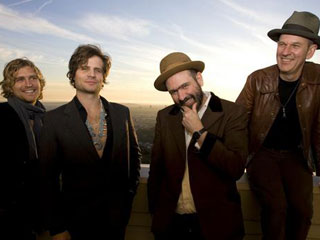American Music Club Comes to Buffalo
by Joe Sweeney
Mark Eitzel Brings His Revitalized Band American Music Club To Buffalo
Is “sad” music more beautiful? Is “happy” music less substantial?
When Artvoice posed this question to Mark Eitzel, he was prepared with an elaborate response. Perhaps this is because Eitzel’s band American Music Club is responsible for some of the most stunning, gut-wrenching songs of the last 20 years. At one point in his career, if he wasn’t airing out the darkest parts of his soul, Eitzel would have been short on material. Although they were often delivered with searing sarcasm, his creations have a tough time escaping the label of “sad songs.”
“Because of the invasion of psychology into all of our lives, one talks about happy vs. sad. But I don’t really see it; I see it as real vs. false,” Eitzel shares. “When I was younger I’d see lots of shows—I still do actually—and some performers, well, they’re bigger than their boots. They’re rockers on a huge world stage, and they don’t really look at you. And the songs they write are not about you; they’re about them. You sit in the back of the room and drink your drink and say, ‘Shit, I’m not getting anything out of this. Fuck them!’”

On American Music Club’s new album The Golden Age—its ninth since it formed in 1983 and second since re-uniting in 2004 after a 10-year hiatus—listeners get to experience the refined approach of an older, wiser band. Gone are the knock-out lyrical jabs of tunes like “The Dead Part of You,” from the band’s 1991 masterpiece Everclear, a song that begins with the line, “The price of your soul is worth less than the cab fare that gets you home before the living end.” In their place are simple, acoustic compositions and tender, introspective lyrics about love and loss, delivered in more of an unbiased narrative.
“Perhaps to the chagrin of some old-time American Music Club fans, the music is not quite so dark,” Eitzel admits. “I’m not tearing my chest open and exposing my shriveled little heart. I’m kind of sick of being that person. I’m just singing the songs, trying to be entertaining.”
That’s not to say that the singer/songwriter has “gone happy”—which could be the equivalent of “selling out” for the AMC faithful. He’s toned down the drama and become more storyteller than confessional poet, but The Golden Age doesn’t represent a shift from darkness to light. It’s more of a hopeful grayness, like that moment before dawn when the moon first begins to relinquish its throne.
Gently propelled by the acoustic picking of AMC guitarist Vudi, “All My Love” opens The Golden Age on a whisper-soft, positive note. “I wish that we were always high/I wish that we could swim in the sky,” Eitzel opines, eventually sharing in the chorus, “I could give you all my love.” It’s a simple, serene love song, saved from mawkishness by all the “wishes” and “coulds.” And it’s a pleasure to hear Eitzel sing it in his rich, ethereal tenor.
“So,” a lover of the vitriolic, unruly brilliance of the younger Eitzel might say, “what’s the deal with all the hope and love and sky-swimming?”
“I’ve changed as a person; you kinda have to,” the singer explains. “When I first wrote all of those American Music Club records, my folks had just died of cancer and I had several friends dying of AIDS. It was in this world of downtrodden San Francisco. And that whole world’s gone; it doesn’t exist anymore for me.”
Eitzel’s still being honest on The Golden Age; his world just isn’t as tumultuous these days. The singer, Vudi and two new band members, bassist Sean Hoffman and drummer Steve Didelot, have made a tender rock album packed with interesting lyrical abstractions (e.g. “Neptune’s the scary soldier who wants to show you his gun”) and touching melodies. And while Vudi’s elegant acoustic playing is at the heart of the record, the songs that stray from that formula are instantly memorable, such as the booming harmonies of “The Victory Choir” and the drunken mariachi waltz “I Know That’s Not Really You.”
Still, those who don’t truck with Eitzel’s “real vs. fake” idea would likely call The Golden Age another collection of sad tunes from the beloved San Francisco group. The bandleader’s got more to say about that.
“I don’t really care what people think, happy or sad,” he shares. “Everyone is waiting for the message from the great beyond. That’s what they really want. They want to hear something that is a lightning rod in their life, something that kills the sense of time and kills the sense of the day-to-day shit they have to deal with, that really turns them on and makes them feel like, ‘Boom. Suddenly, I feel the sun on my face.’
“Billie Holiday would do that to me,” Eitzel continues. And as he attempts to make a “different strokes for different folks” point about music, he stumbles across a concept that’s way more miserable than any song he ever wrote:
“For some people, it takes Korn. And for some people, it takes Nickelback—oh my gosh.” He laughs. “Can you imagine the kind of person that Nickelback makes happy? Can you imagine the darkness in that heart, for such mediocrity and drivel, such completely phony, aerated blubber to make somebody happy? How depressing!”
American Music Club is playing Mohawk Place on Wednesday, April 16. It’s an extraordinary opportunity to see one of rock’s most uncompromising songwriters at one of the city’s most intimate venues. Buffalo, prepare to feel the sun on your face.
blog comments powered by Disqus|
Issue Navigation> Issue Index > v7n15: Best of Buffalo 2008 (4/10/08) > Music > American Music Club Comes to Buffalo This Week's Issue • Artvoice Daily • Artvoice TV • Events Calendar • Classifieds |









 Current Issue
Current Issue